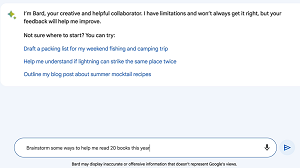News
Google Plays AI Catch-Up with Bard Search, Docs/Gmail Moves
After seeing Microsoft sprint to the forefront in the race to harness generative AI for corporate products, Google is playing catch up, today announcing a waitlist for the company's Bard search chatbot, following a recent announcement of AI-infused enhancements to Docs and Gmail.
Microsoft, on the strength of a $10 billion-plus investment into AI frontrunner OpenAI, already introduced its AI-powered "new Bing" search chatbot in February, and just last week announced the experience has for some time been powered by a brand-new, supercharged large language model (LLM) from OpenAI called GPT-4 (see "GPT-4, Powering New Bing, 'Surpasses ChatGPT in Its Advanced Reasoning Capabilities'"). Also last week, Microsoft demoed Microsoft 365 Copilot, which brings natural language AI capabilities into virtually every corner of its productivity stack (see "AI Everywhere, All at Once: Microsoft Unveils Microsoft 365 Copilot").
Google's countermoves include the March 14 announcement of "A new era for AI and Google Workspace" and today's invitation to "Try Bard and share your feedback."
"Today we're starting to open access to Bard, an early experiment that lets you collaborate with generative AI," Google said today (March 21). "This follows our announcements from last week as we continue to bring helpful AI experiences to people, businesses and communities."
While inviting users to sign up for the Bard waitlist, Google emphasized the "early experiment" status, focusing on garnering feedback to improve the product and using it responsibly according to the company's AI Principles while maintaining quality and safety.
 [Click on image for larger view.] "I'm Bard ..." (source: Google).
[Click on image for larger view.] "I'm Bard ..." (source: Google).
"Large language models will not always get it right," Google said today. "Feedback from a wide range of experts and uses will help Bard improve."
As far as the backing tech, while Microsoft avails itself of the GPT-4 LLM (the infamous ChatGPT chatbot was powered by GPT-3.5), Bard is powered by a research LLM described as a lightweight and optimized version of LaMDA, which was announced in May 2021 when Google called its homegrown solution "our breakthrough conversation technology."
"It's grounded in Google's understanding of quality information," Google said. "You can think of an LLM as a prediction engine. When given a prompt, it generates a response by selecting, one word at a time, from words that are likely to come next. Picking the most probable choice every time wouldn't lead to very creative responses, so there's some flexibility factored in. We continue to see that the more people use them, the better LLMs get at predicting what responses might be helpful."
The Google Workspaces announcement, meanwhile, said new AI-powered capabilities will allow users to:
- draft, reply, summarize, and prioritize your Gmail
- brainstorm, proofread, write, and rewrite in Docs
- bring your creative vision to life with auto-generated images, audio, and video in Slides
- go from raw data to insights and analysis via auto completion, formula generation, and contextual categorization in Sheets
- generate new backgrounds and capture notes in Meet
- enable workflows for getting things done in Chat
Those capabilities will be rolled out in a trusted tester program, after which they will be refined via a series of iterations.
In a sentence that could apply equally to Bard, Google last week said, "When it comes to delivering the full potential of generative AI across Workspace, we're just getting started."
Microsoft, of course, had already gotten started. Thus the recent announcements could be seen as the initial moves to catch up to Microsoft and OpenAI, as they followed industry reports that Google launched a "code red" directive last December amid the buzz about ChatGPT.
About the Author
David Ramel is an editor and writer at Converge 360.